US egg prices more than double the national average of $3.59
>
The skyrocketing price of eggs is upsetting grocery store checkouts across the country.
The national average price for a dozen eggs hit $3.59 in November, up from $1.72 a year earlier, the latest government data shows. Prices have likely risen further since then.
A prolonged outbreak of bird flu, combined with rising feed, fuel and labor costs, has contributed to more than doubling in egg prices and has produced many surprises for consumers.
Eye-popping prices for the staple are putting a strain on household budgets and the bottom lines of restaurants, bakeries and other food producers that rely heavily on eggs.
Amid widespread inflation, overall grocery prices rose 12 percent in November, though the overall pace of price increases slowed slightly in the fall as gasoline prices eased.
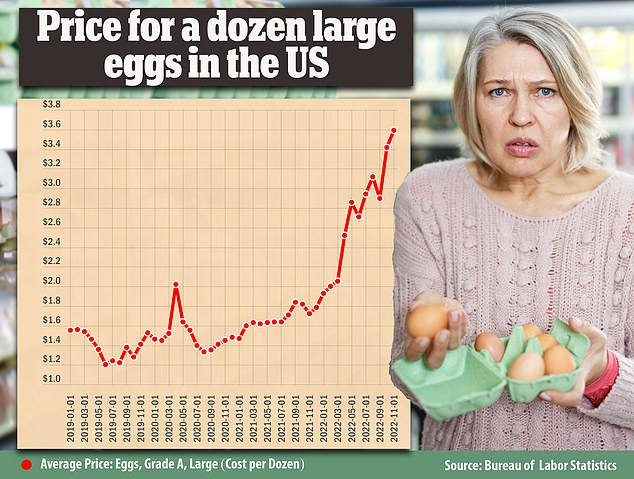
The national average price for a dozen eggs hit $3.59 in November, up from $1.72 a year earlier, the latest government data shows.
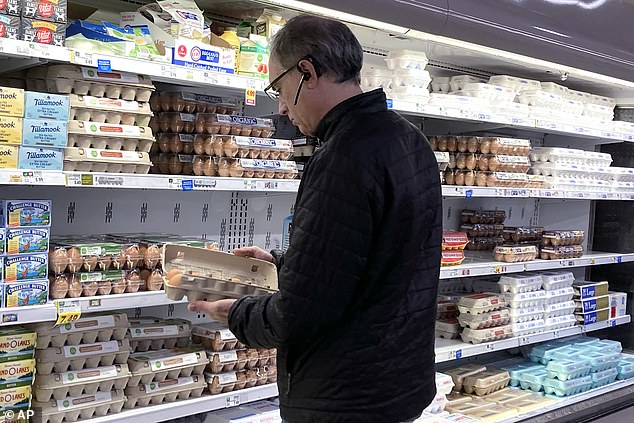

A shopper checks eggs before shopping at a grocery store in Glenview, Illinois, on Tuesday. Anyone shopping for a dozen eggs these days will have to be prepared for sky-high prices.
But egg prices have risen significantly more than other foods, even more than chicken or turkey, because egg farmers were hit hardest by bird flu.
More than 43 million of the 58 million birds culled over the past year to control the virus have been laying hens, including some farms with more than a million birds each in major egg-producing states like Iowa.
Everyone who walks up to the carton of eggs at a Hy-Vee grocery store in Omaha “gets a sour face,” said shopper Nancy Stom.
But even with the cost increases, eggs remain relatively cheap compared to the price of other proteins such as chicken or beef, with a pound of chicken breast averaging $4.42 in November and a pound of ground beef for $4.85, according to the Bureau. of Labor Statistics.
“It’s still a cheap eat,” Stom said. But the 70-year-old said that at these prices, she’ll keep a closer eye on her eggs in the fridge and try not to let them go bad before they’re used.
If prices stay this high, Kelly Fischer said she will start thinking more seriously about building a chicken coop in Chicago because everyone in her family eats eggs.
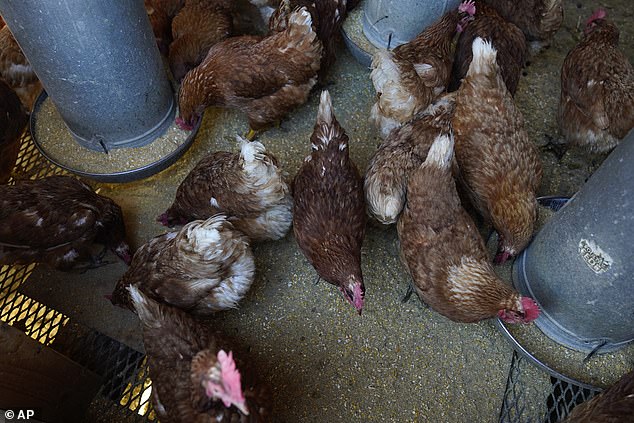

Red Star chickens feed in their coop Tuesday at the historic Wagner Farm in Glenview, Illinois. More than 43 million laying hens have been culled in the last year to contain bird flu.
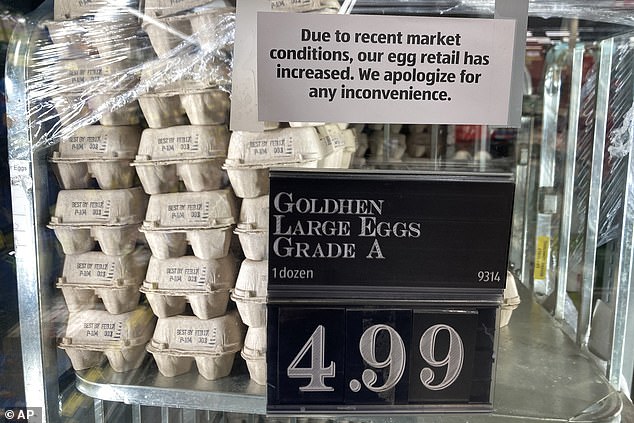

A grocery store in Cheverly, Maryland, posts a sign to apologize for raising the price of its eggs on Tuesday.
“We (with the neighbors) are contemplating building a chicken coop behind our houses, so eventually I’m hoping not to buy them and have my own eggs and I think the cost comes into play,” said the 46-year-old public school teacher. her while she shops at HarvesTime Foods on the north side of town. “For me, it’s more about the environmental impact and trying to buy local.”
In some places, it can even be hard to find eggs on the shelves. But overall egg supplies are holding up because the total flock is only down 5% from its normal size of around 320 million hens. Farmers have been working to replace their herds as soon as possible after an outbreak.
Jakob Werner, 18, said he tries to find the cheapest eggs he can because he eats five or six of them a day while trying to gain weight and build muscle.
“For a while, I stopped eating eggs because they got more expensive. But because they are my favorite food, I eventually went back to eat them,” said Werner, who lives in Chicago. “So I think for a few months I stopped eating eggs, I waited for the price to come down. He never did. So now I’m buying again.’
Purdue University agricultural economist Jayson Lusk said he believes the bird flu outbreak is the main driver of the price increases. Unlike previous years, the virus persisted throughout the summer and reemerged last fall, infecting poultry and egg farms.
“Avian influenza is not the only factor, but in my opinion it is the main driver of what we are experiencing right now,” Lusk said.
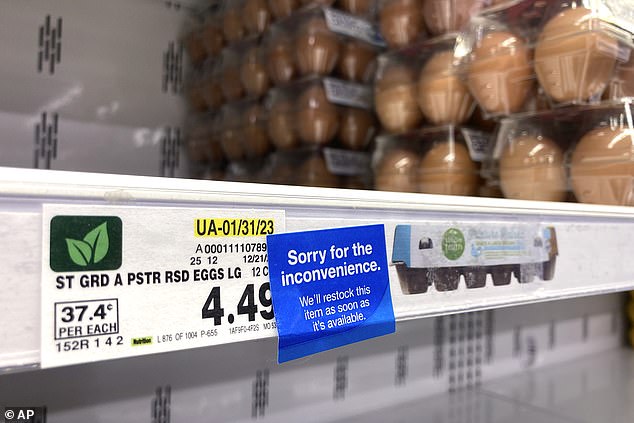

An out of stock eggs information sign is seen at a grocery store in Glenview, Illinois
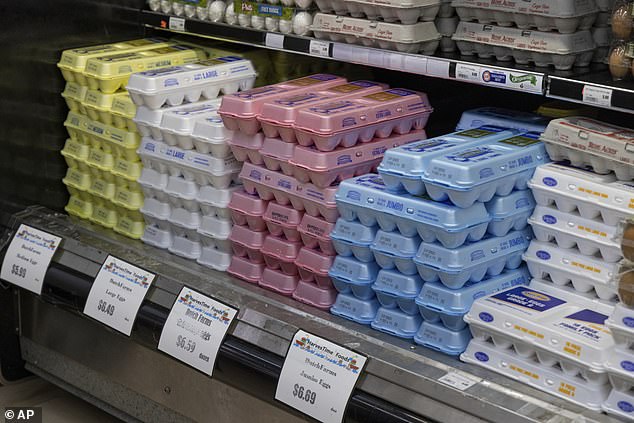

Egg cartons are displayed at HarvesTime Foods on January 5 in Chicago.
But the president and chief executive of the American Egg Board trade group, Emily Metz, said she believes all the cost increases farmers have faced in the past year were a bigger factor in the price rises than bird flu.
“When you see fuel costs go up, and you see feed costs go up by as much as 60%, labor costs, packaging costs, all of that…those are far more important factors than the flu avian for clear,’ Metz said.
Jada Thomson, an agricultural economist at the University of Arkansas, said there could be some relief in egg prices in the next two months because egg farmers have been steadily replacing their flocks lost to bird flu last year and demand It will slow down a bit now that folks are done with their holiday baking.
But he said bird flu remains a wild card that could still drive up prices if there are larger outbreaks on egg farms.
Farmers are doing everything they can to limit the spread, but the disease is easily spread by migrating wild birds and the virus can be picked up on clothing or vehicles.
“But there are some things that are out of our control,” Thompson said. Sometimes you can’t control nature.


A shopper checks eggs before buying them at a grocery store in Glenview, Illinois, on Tuesday.
Food producers and restaurants are suffering because it’s hard to find a good substitute for eggs in their recipes.
Any drop in egg prices would be welcome at Patti Stobaugh’s two restaurants and two bakeries in Conway and Russelville, Arkansas, because all her ingredients and supplies are more expensive these days.
For some of her baked goods, Stobaugh has switched to a frozen egg product that isn’t as expensive, but she still buys eggs for all the breakfasts she serves.
A 15-dozen carton of eggs has gone from $36 to $86 in the last year, but the flour, butter, chicken and everything else you buy is more expensive, too. Stobaugh said that has her “hyper alert about every little item.”
She already raised her prices by 8 percent last year and may have to raise them again soon.
It’s a delicate balance trying not to make it too expensive for people to eat out and hurt sales, but he doesn’t have much choice when trying to keep his 175 employees.
‘We have many employees who work for us and we are responsible for paying the payroll each week and supporting their families. We take it very seriously. But it certainly has been tough,” Stobaugh said.
